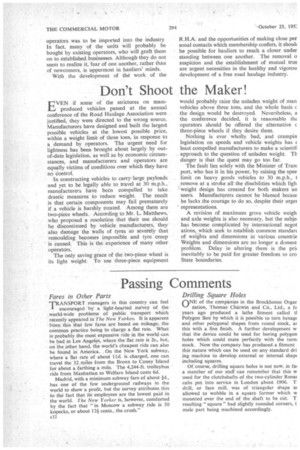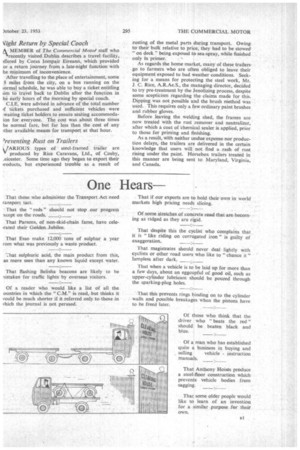Passing Comments
Page 34

Page 35

If you've noticed an error in this article please click here to report it so we can fix it.
Fares in Other Parts
TRANSPORT managers in this country can feel encouraged by a light-hearted survey of the world-wide problems of public transport which recently appeared in The New Yorker. It is apparent from this that few fares are based on mileage, the common practice being to charge a flat rate. What is' probablythe most expensive ride in the world can be had in Los Angeles, where the flat rate is 2s., but, on the other hand, the world's cheapest ride can also be foUnd in' America. On the New York subway, where a flat rate of about 11d. is charged, one can travel the 32. miles from the Bronx to Coney Island for about a farthing a mile. The 4,244-ft. trolleybus " ride from Manhattan to Welfare Island costs 6d.
Madrid, with a minimum subway fare of about id., has one of the few underground railways in the world to show a profit, but the survey attributes this to the fact that its employees are the lowest paid in the world. The New Yorker is, however, comforted by the fact that " in Moscow a subway ride is 50 kopecks, or about 12i cents., the crush."
A32
Drilling Square Holes
nNE of the companies in the Brockhouse Orgar zation, Thomas Chatwin and Co., Ltd., a ft years ago produced a lathe fitment called tl Polygon Box by which it is possible to turn hexagt and other polygonal shapes from round stock, at this with a fine finish. A further development w that the device could be used for boring polygon holes which could mate perfectly with the tut-n.1 stock. Now the company has produced a fitment this nature which can be used on any standard dri ing machine to develop external or internal shapt including squares.
Of course, drilling square holes is not new, in fai a member of our staff can remember that this w used for the clutchshafts of the two-cylinder Renat cabs put into service in London about 1906. I"! drill, or face mill, was of triangular shape ai allowed to 'wobble in a square former which w mounted over the end of the shaft to be cut. T resulting " square " had slightly rounded corners, t male part being machined accordingly.
Vight Return by Special Coach
MEMBER of The Commercial Moto, staff who 'recently visited Dublin describes a travel facility, iffered by Coras Iorripair Eireann, which provided or a return journey from a late-night function with he minimum of inconvenience. After travelling to the place of entertainment, some 5 miles from the city, on a bus running on the Lormal schedule, he was able to buy a ticket entitling Lim to travel back to Dublin after the function in he early hours of the morning by special coach. C.LE. were advised in advance of the total number If tickets purchased and sufficient vehicles were .waiting ticket holders to ensure seating accommodaion for everyone. The cost was about three times he normal fare, but far less than the cost of any alter available.me.ans for transport at that hour.
'reventing Rust on Trailers
VARIOUS types of steel-framed trailer are produced by Rice Caravans, Ltd., of Cosby, ..eicester. Some time ago they began to export their iroducts, but experienced trouble as a result of rusting of the metal parts during transport. Owing to their bulk relative to price, they had to be stowed "on deck" being exposed to sea-spray, while finished only in primer.
As regards the home market, many' of these trailers go to farmers who are often obliged to leave their equipment exposed to bad weather conditions. Seeking for a means for protecting the steel work, Mr. J. C. Rice, A.R.Ae.S., the managing director, decided to try pre-treatment by the Jenolizing process, despite some scepticism regarding the claims made for this. Dipping was not possible and the brush method was used. This requires only a few ordinary paint brushes and rubber gloves.
Before leaving the welding shed, the frames are now treated with the rust remover and neutralizer, after which a coat of Chemical sealer is applied, prior to those for priming and finishing.
As a result, with neither undue expense nor production delays, the trailers are delivered in the certain knowledge that users will not find a rash of rust rising under the paint. Horsebox trailers treated in this manner are being sent to Maryland, Virginia, and Canada.




































































































